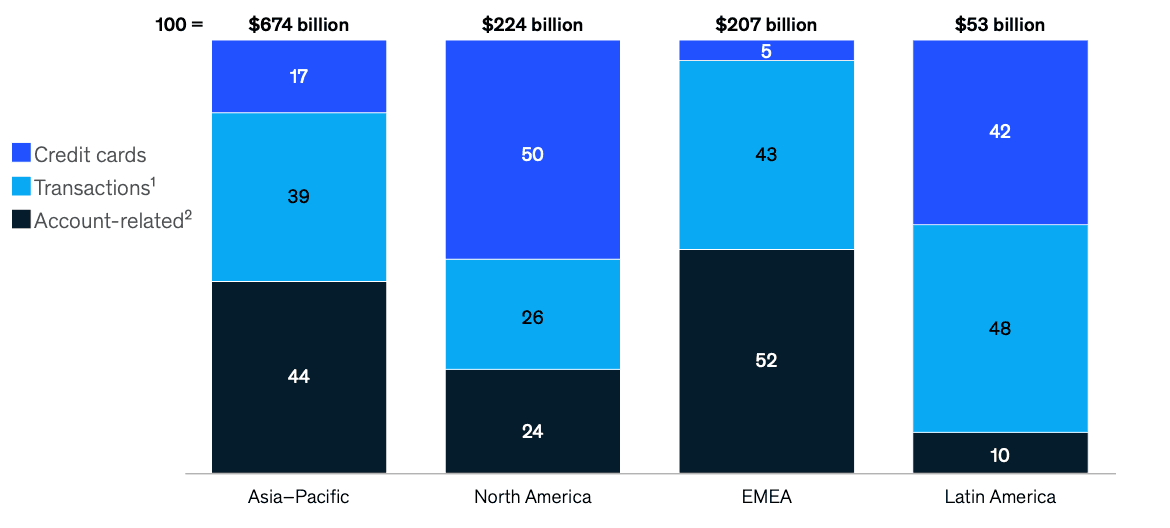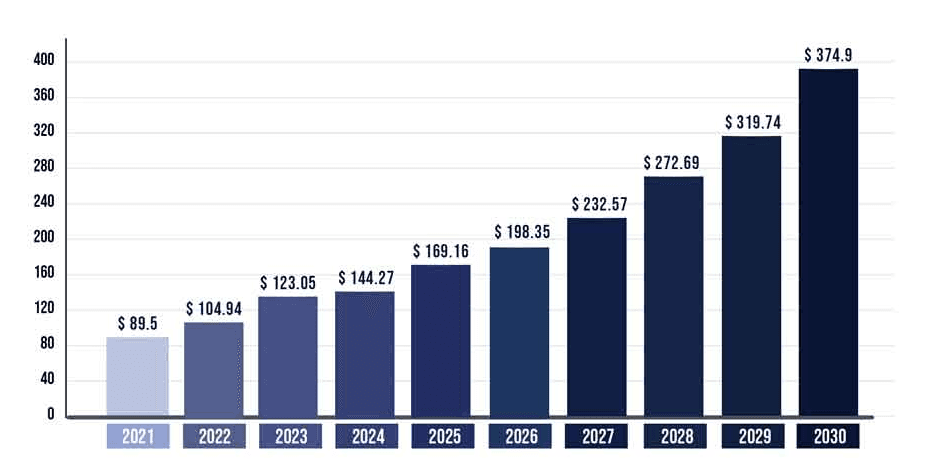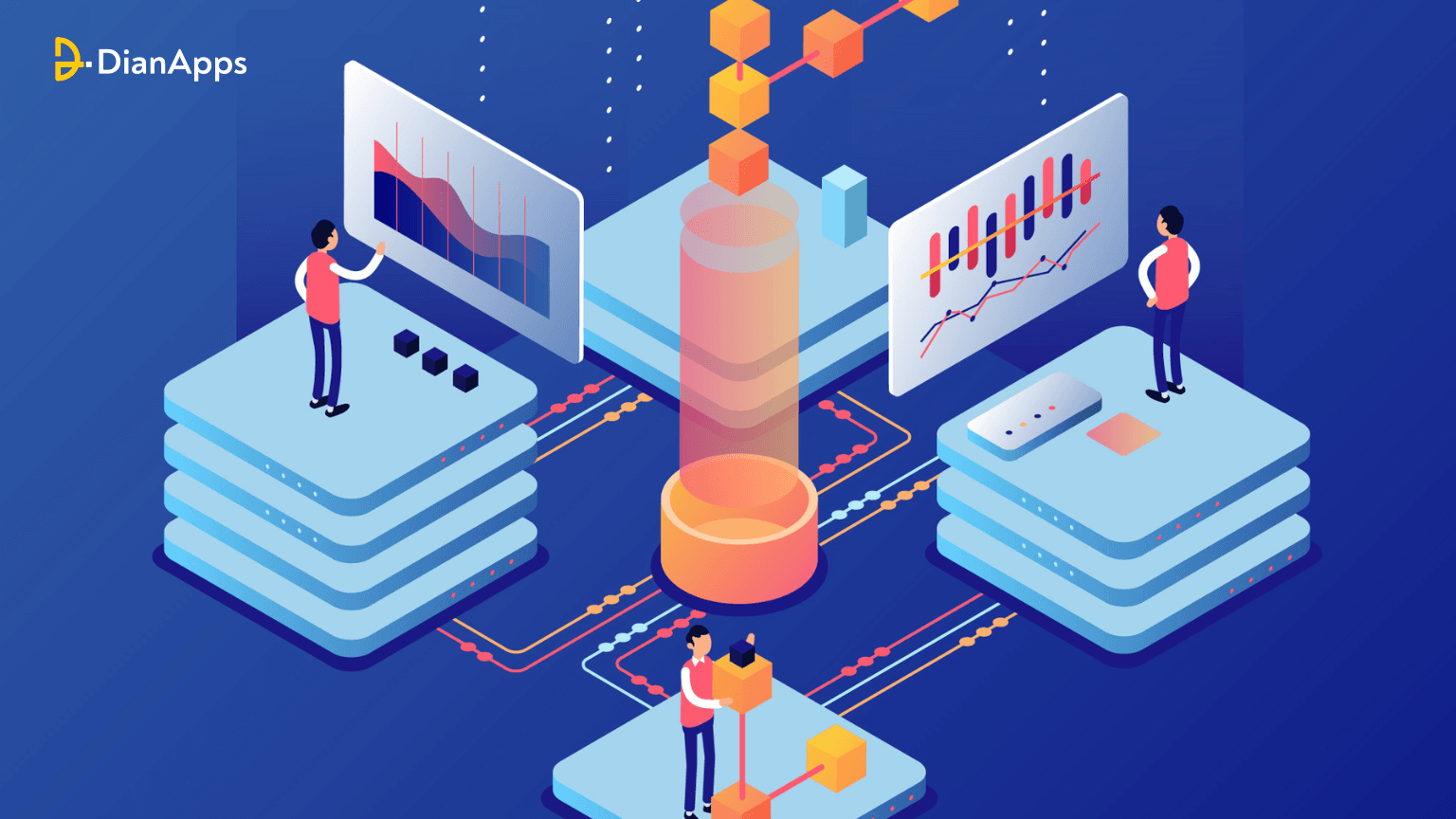As innovations shoot up in the emerging fintech market, digital payment transactions are also touching the skies. The introduction of state-of-the-art technologies in banks and Fintech companies optimizes the way of conducting transactions and transferring money.
Let’s look at the growth in regional payment revenue through statistics:
- The total transaction value in the Digital Payments market is forecasted to reach US$11.55 trillion in 2024.
- The total transaction value is anticipated to exhibit an annual growth rate (CAGR 2024-2028) of 9.52%, leading to a projected total amount of US$16.62 trillion by 2028.
- In a global comparison, China leads with the highest accumulated transaction value, reaching US$3,744.00 billion in 2024.

- The worldwide digital payment market size is predicted to reach approximately USD 374.9 billion by 2030, set to grow at a compound annual growth rate (CAGR) of 17.25% from the year 2022 to 2030.

With the graph of digital payments rising higher, it opens the door to opportunities for businesses to expand their user base and increase cash flows. Businesses can effectively develop custom fintech apps taking benefit from advanced tools available to meet the expectations of clients and customers.
If you find all this convincing and interest you to find more on the tech stack to be used for Fintech app development services, then you’re at the right place!
So, let’s put first things first and understand why it is important to choose the appropriate tech stack.
Importance of Tech Stack in Fintech Innovation
The world of online finance, known as FinTech, is growing fast. By 2026, it could be worth $324 billion. This growth is changing how businesses and people handle money online.
Businesses in the Finance Industry are constantly surviving, thriving, and staying current with the most recent trends and technologies in 2024.
FinTech Software development companies need to use the latest technology to keep up with these changes. This is necessary to develop contemporary, safe, and adequate financial software and solutions. For this reason, the technology that will be used in crafting such apps/software is crucial. This includes things like blockchain, artificial intelligence, and smart devices. These tools can make financial services safer, faster, and more innovative.
The tools and software that FinTech companies use to build their services are called a “tech stack.” Choosing the right tech stack is important. It involves looking at what the project needs, how safe it is, how well it can grow, and how much it costs.
By picking the right tech stack, FinTech companies can create services that work well, keep people’s money safe, and can adapt to changes quickly.
Also, read Things You Need To Know About FinTech Software Development.
How to choose a secure tech stack for your fintech application development?
Assess your project requirements
The first step in selecting a tech stack for your FinTech software is to thoroughly analyze your project requirements. Consider factors such as the type of product, its complexity, and the specific functionalities it needs to support. Ask yourself questions like:
- What are your expectations from the app/software?
- Who will be your target audience?
- How is your app/software going to be used – on mobile devices or the web?
- When do you want this to be completed and launched?
Tailor your tech stack choice to align with these requirements for optimal performance and functionality.
Pro Tip: Consider building an MVP for your software development project and then integrate extra features into it after working on the client feedback.
App Architecture
Fintech App Development consists of numerous elements along with stakeholders’ requirements. That’s where two types of app architecture come into the picture.
- Microservice architecture: Here, the app is developed in several parts that are interconnected with each other through APIs.
- Serverless architecture: It’s a way to develop and run applications and services without handling infrastructure.
Development speed
Development speed becomes essential when choosing a tech stack. If your development speed is lower, then the costs would be high. So, to avoid that, you must choose an app framework or programming language that provides ready-made solutions so you can buckle up your Fintech software development process. Considering cross-platform technologies like Xamarin or Flutter can help you in making an MVP rather than building a detailed version of your app. You can also use wireframes or agile practices along with it.
Security
Given the sensitive nature of financial data involved, prioritize security when choosing a tech stack. Look for technologies and frameworks that offer robust security features to safeguard user data and protect against potential threats and breaches.
Scalability
A key consideration for long-term success is scalability. Choose a tech stack that can easily accommodate future growth and changing demands in the FinTech landscape. Opt for technologies that offer scalability features, allowing your software to adapt and expand seamlessly as needed.
Cost-effectiveness
Evaluate the cost implications of both ready-made tools and development efforts when selecting a tech stack. Aim for a balance between affordability and quality to ensure your FinTech solution is cost-effective without compromising on performance or security.
Compliance
Make sure that your selected tech stack matches with regulatory compliance requirements and industry-specific standards. Whether it involves securely recording data, automating financial tasks, or calculating credit scores, your tech stack should support compliance needs and enable you to build solutions that meet regulatory guidelines effectively.
Threat Detection & Fraud Prevention
Digital FinTech is evolving at a great speed, so businesses need to ensure protection against malicious threats and fraudulent activities. This necessitates the integration of robust threat detection technologies and fraud prevention tools into secure payment solutions. The tools, such as artificial intelligence, biometric authentication, blockchain, and tokenization, work in sync to monitor transactions, detect fraudulent activity, and ensure real-time data sharing for fraud prevention. By implementing these advanced tools, FinTech companies can protect their clients and uphold their business reputation in the face of evolving security challenges.
Budget
The most important factor of the entire software development lifecycle. Make a detailed budget of the software before starting the process. Think carefully about how much money to spend on Fintech app development for your business. There are many free and open-source app development frameworks available in the market that can help you achieve the same results as compared to the paid ones. Therefore, go for a tech stack that is familiar to you as it becomes easy to save both time and money.
Use of DevOps
DevOps plays a great role in modern-day custom software development since it is a combination of two things – Development and IT operations which help in compressing the development cycle and seamlessly deliver high-quality software.
Best tech Stack for Fintech Software Development in 2024
Front-end Technologies
Front-end technologies like JavaScript and its frameworks, such as React, Angular, and Vue, are essential for providing users with a fast, responsive, and intuitive experience in fintech applications. React offers reusable components and excellent performance with virtual DOM. Angular emphasizes performance optimization and code maintainability. Vue provides a flexible architecture for seamless front-end development.
Frameworks
Frameworks like Spring Boot, Django, Flask, and Express extend the capabilities of programming languages. Spring Boot, an extension of the Spring Java framework, offers a comprehensive toolkit for banking microservices and compliance monitoring. Django provides built-in security features and is strong in building RESTful APIs. Flask is lightweight and suitable for quick prototyping and rapid development. Express enables the building of interactive fintech applications with its fast and opinionated framework for Node.js.
Back-end Technologies
Commonly used Programming languages like Java, Python, C#, and Node.js are used in the back-end development of fintech software. Java is preferred for its multithreading capabilities and efficient memory management, ideal for large-scale banking applications. Python’s simplicity and extensive library ecosystem make it suitable for data-intensive tasks and machine learning. C# in the .NET ecosystem offers dynamic applications with enhanced security and performance. Node.js is versatile for real-time and scalable financial applications due to its non-blocking, event-driven architecture.
Databases
SQL and NoSQL databases serve different purposes in fintech applications. SQL databases like PostgreSQL, MySQL, and MS SQL Server excel in structured data storage and complex querying. NoSQL databases like MongoDB and Cassandra are ideal for managing unstructured data and support horizontal scaling for handling large volumes of data. SQL databases ensure data accuracy and organization for critical financial data, while NoSQL databases are flexible for storing and managing unstructured data such as user feedback and preferences.
Cloud Providers
Cloud computing has revolutionized fintech, offering access to data processing and storage without managing hardware. AWS provides a broad range of tools, including AI services, tailored for fintech with its Fintech Blueprint. Google Cloud Platform offers AI/ML, data analytics, and big data tools for building resilient FinTech applications. Microsoft Azure provides capabilities for managing financial services data, workflow automation, and intelligent tools.
APIs and Integrations
Fintech applications rely on APIs for connecting with external services like payment gateways. RESTful APIs, widely used and scalable, facilitate data exchange but may impact performance due to multiple requests. GraphQL minimizes over-fetching and under-fetching, reducing network round trips, and supporting real-time subscriptions.
Security
Fintech applications face security risks, necessitating secure authentication and authorization mechanisms. OAuth and JWT provide robust authentication and authorization, enhancing data privacy and SSO capabilities. HTTPS, TLS, and encryption algorithms ensure data security during transmission and at rest. API security testing tools like Sapience help identify vulnerabilities in the API ecosystem.
Data Analytics and Machine Learning
Data analytics and machine learning are pivotal in modern fintech. Tools like Apache Spark, Hadoop, and Flink enable the processing of large datasets for risk assessments and predictive modeling. Machine learning libraries like Scikit-learn, TensorFlow, and PyTorch aid in fraud detection, credit scoring, and risk management.
Compliance and Regulation Tools
Fintech companies must adhere to complex regulatory frameworks like GDPR and PSD2. Compliance tools assist in implementing mechanisms for user consent, automated KYC processes, and monitoring financial transactions for suspicious activities. These tools ensure compliance with data tracking requirements and facilitate adherence to local banking regulations.
Microservices
Microservices architecture enhances the scalability, maintenance, and performance of fintech applications. Breaking down applications into smaller, independent services allows for easier updates and scalability. Microservices align with agile development and DevOps practices, enabling frequent releases and continuous integration.
Conclusion
In a nutshell, selecting the right technology stack is essential for crafting successful financial solutions. At DianApps, we understand the importance of choosing the most suitable tools to tackle challenges such as security and compliance in fintech app development. With our expertise in creating innovative financial solutions, we are well-equipped to help companies in fintech software development services that not only meet customer needs but also exceed their expectations.
Get in touch with us today to discuss your concept and let us guide you towards building a standout fintech solution. Reach out now to start the conversation!










Leave a Comment
Your email address will not be published. Required fields are marked *